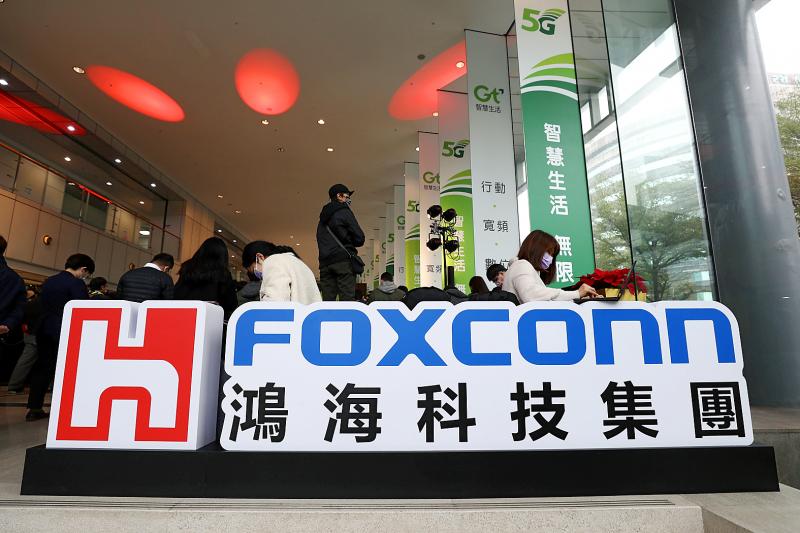Apple Inc’s local manufacturing partner Hon Hai Precision Industry Co (鴻海精密), known as Foxconn Technology Group (富士康科技集團) outside of Taiwan, is setting up a vehicle venture, strengthening its automotive capabilities at a time when technology companies, including its California ally, are looking to expand in automaking.
Hon Hai is joining forces with Chinese automaker Zhejiang Geely Holding Group Co (浙江吉利控股集團) to provide production and consulting services to global automotive enterprises, the companies said in a statement yesterday.
The production and consulting services are related to whole vehicles, parts, intelligent drive systems and automotive ecosystem platforms, Hon Hai said in a filing with the Taiwan Stock Exchange.

Photo: EPA-EFE
Each party is to hold a 50 percent stake in the new joint venture, FuTaiHua Industrial (Shenzhen) Ltd (富泰華工業深圳), with Hon Hai appointing three directors, including the chairperson, to the venture’s five-member board and Geely appointing two, the filing said.
Amid reports of Apple considering making its own electric vehicles (EVs), Hon Hai has been bulking up its automotive muscles swiftly. Such moves might help the company become a major contender to make vehicles for its largest customer.
With development work still at an early stage, Apple would take at least half a decade to launch an autonomous electric vehicle, people with knowledge of the efforts have told Bloomberg News.
That suggests the company is in no hurry to decide on potential auto-industry partners.
Hon Hai in October last year unveiled its first-ever EV chassis and a software platform aimed at helping automakers bring models to the market faster.
It plans to deliver its first development kit in April, with Hon Hai chairman Young Liu (劉揚偉) saying that EV-related business in the first half of this year would be “very good.”
Hon Hai’s key unit, Foxconn Technology Co (鴻準精密), is reportedly expanding a plant to develop automotive metal parts.
Earlier this month, Hon Hai signed a manufacturing deal with embattled Chinese electric-vehicle start-up Byton Ltd (拜騰) with the aim to start mass production of the Byton M-Byte by the first quarter of next year.
Setting up an auto plant can cost billions of US dollars and take years, which is probably why Apple is talking to potential manufacturing partners.
The company has continued to investigate building its self-driving vehicle system for a third-party auto partner rather than its own vehicle, the people familiar with matter have said, and the company could ultimately abandon its own vehicle efforts in favor of this approach.
Other technology companies seeking to expand into the autonomous driving space have also sought partnerships.
Alphabet Inc’s self-driving unit Waymo has worked with Fiat Chrysler Automobiles NV, while Amazon.com Inc has tapped Rivian Automotive Inc for cooperation over delivery vans.
This week, Geely struck a pact with search-engine giant Baidu Inc (百度) to set up a venture to make intelligent EVs.
Additional reporting by staff writer

South Korea’s equity benchmark yesterday crossed a new milestone just a month after surpassing the once-unthinkable 5,000 mark as surging global memory demand powers the country’s biggest chipmakers. The KOSPI advanced as much as 2.6 percent to a record 6,123, with Samsung Electronics Co and SK Hynix Inc each gaining more than 2 percent. With the benchmark now up 45 percent this year, South Korea’s stock market capitalization has also moved past France’s, following last month’s overtaking of Germany’s. Long overlooked by foreign funds, despite being undervalued, South Korean stocks have now emerged as clear winners in the global market. The so-called “artificial intelligence

‘SEISMIC SHIFT’: The researcher forecast there would be about 1.1 billion mobile shipments this year, down from 1.26 billion the prior year and erasing years of gains The global smartphone market is expected to contract 12.9 percent this year due to the unprecedented memorychip shortage, marking “a crisis like no other,” researcher International Data Corp (IDC) said. The new forecast, a dramatic revision down from earlier estimates, gives the latest accounting of the ongoing memory crunch that is affecting every corner of the electronics industry. The demand for advanced memory to power artificial intelligence (AI) tasks has drained global supply until well into next year and jeopardizes the business model of many smartphone makers. IDC forecast about 1.1 billion mobile shipments this year, down from 1.26 billion the prior

People stand in a Pokemon store in Tokyo on Thursday. One of the world highest-grossing franchises is celebrated its 30th anniversary yesterday.

Chinese artificial intelligence (AI) start-up DeepSeek’s (深度求索) latest AI model, set to be released as soon as next week, was trained on Nvidia Corp’s most advanced AI chip, the Blackwell, a senior official of US President Donald Trump’s administration said on Monday, in what could represent a violation of US export controls. The US believes DeepSeek will remove the technical indicators that might reveal its use of American AI chips, the official said, adding that the Blackwells are likely clustered at its data center in Inner Mongolia, an autonomous region of China. The person declined to say how the US government received